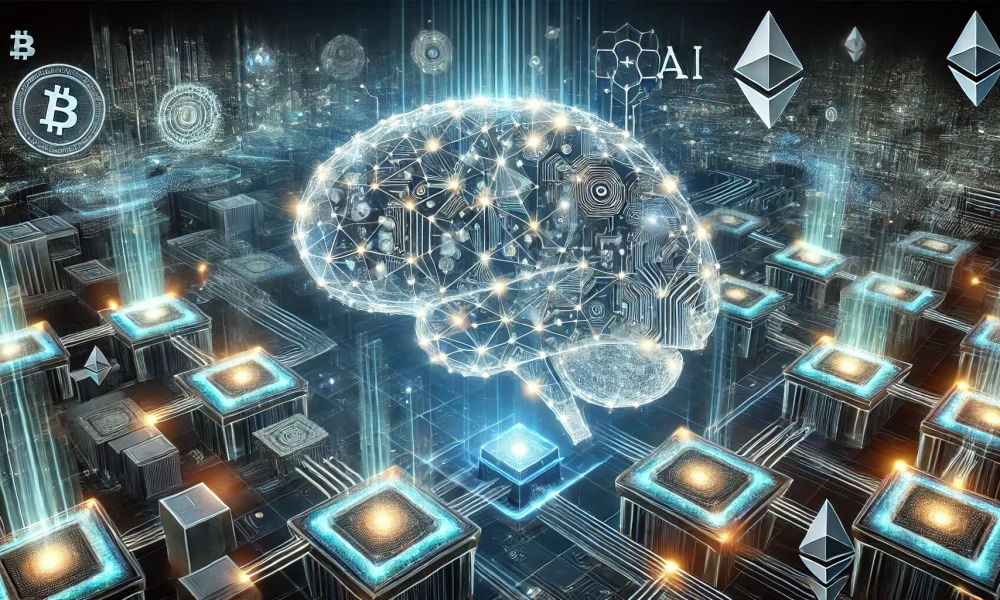For nearly five decades, Apple (AAPL +0.13%) has led technological advancements, consistently broadening its product line to challenge the limits of technology. However, to maintain its growth, this ongoing development requires infrastructure that is constantly growing.
From the early days of personal computers to the introduction of the iPhone, each milestone has required the creation of new data centers, expanding networks, and enhancing production capacities to meet growing demand.
Similar infrastructural challenges confront crypto and blockchain as they merge with technologies like artificial intelligence (AI). As a result of the 222 percent increase in AI agent market valuation in the last quarter of 2024, many cryptocurrency developers continued to investigate new integrations for their projects, making them leaders in the adoption of AI agents.
While the advancement of AI is undeniable, blockchains require stronger foundational support to operate more efficiently with the help of AI agents. The existing infrastructure requires improvement to handle the complexities and demands of this increasing popularity, and without substantial upgrades, the full potential of AI-driven technologies will remain unreachable.
Crypto’s next natural move is autonomy
Gartner predicts that by 2028, 33 percent of projects will implement AI agents, and 15 percent of daily work decisions will be made autonomously. AI agents are expected to take on a significant share of decision-making, primarily for complex, unclear, or difficult-to-solve tasks beyond conventional software algorithms’ capabilities.
By the end of 2025, blockchain networks are projected to support 1 million AI agents, and developers anticipate an increase in financial operations driven by trade optimization, wallet management, and automated yield strategies.
AI agents in the crypto sphere are particularly compelling because they perfectly align with the market’s 24/7 nature. Unlike traditional markets, crypto operates round-the-clock, making autonomous systems particularly useful for managing portfolios since they allow for real-time adjustments based on market analysis, without human intervention.
Despite the more than $2 billion poured into AI startups over the past two years, the infrastructure, particularly in terms of scalability, has struggled to keep up. As use cases continue expanding, investors and industry leaders must focus on readjusting short-term expectations of AI agents.
Patience always pays off
A recent survey indicated that projects aiming to implement AI agents must have access to multiple data sources (specifically eight or more to be exact) to be deployed effectively.
Along with data integrations, AI agents must interact seamlessly with a company’s software while supporting data connections, making security a top priority. A violation or breach by one agent could set off a series of events that could threaten linked systems.
In crypto, a security breach could be catastrophic, resulting in a loss of trust and long-term damage to the entire ecosystem. Since blockchain operates on the decentralization principle, any weakness in an AI agent could allow malicious individuals to take advantage of vulnerabilities.
Another obstacle to greater adoption is the danger of model collapse. This occurs when an AI system becomes repetitive and forgetful, losing the adaptability that makes it effective to begin with. It typically happens when the agent struggles to integrate new information, limiting its adaptability.
To prevent these foundational roadblocks, developers need to emphasize flexibility in AI agents. The blockchain environment is continuously evolving, so AI agents must be designed to keep up with ongoing changes. This requires continuous model training to ensure they can absorb new information and adapt to the growing environment.
AI agents won’t be perfect from the start, and they are not required to be. What truly makes them valuable is their ability to evolve and adjust over time to meet standards as they progress. In early January, 90 percent of AI agents launched have failed. However, that isn’t always a negative thing because it means that the only people who will survive are those who take the time to invest in the hardware and utility.
As they grow, so does user understanding and trust, along with the need to adapt to the autonomy these systems offer. However, users must feel secure in the system’s capabilities before fully embracing its potential.
Blockchain is an industry where ideas sometimes outpace what is currently possible in terms of infrastructure and technology. However, with AI agents, blockchain can advance innovation but needs time to overcome technical challenges before delivering its full potential. Until then, developers should prioritize refining their technology, ensuring investors gain confidence in the AI agents’ ability to deliver on their promises.
